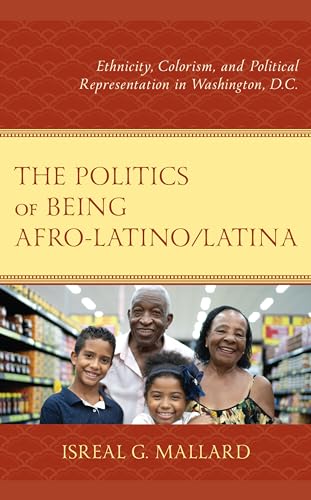The Politics of Being Afro-Latino/Latina
Ethnicity, Colorism, and Political Representation in Washington, D.C.
Isreal G. Mallard
BOOK REVIEW

In the complex labyrinth of identity politics, The Politics of Being Afro-Latino/Latina: Ethnicity, Colorism, and Political Representation in Washington, D.C. emerges as a beacon, illuminating the multifaceted struggles and triumphs of Afro-Latino and Latina individuals in a landscape often overshadowed by rigid categorizations. Isreal G. Mallard crafts an intricate narrative that challenges our understanding of ethnicity, power dynamics, and the oft-ignored nuances of colorism, where skin tone can serve as both a barrier and a bridge.
Mallard is not just a scholar weaving theories; he is an activist, a voice for the overlooked in the corridors of power. His work compels you to confront uncomfortable truths embedded in the fabric of American political discourse. As you delve into this thought-provoking analysis, you may feel your preconceived notions rattled, forcing you to reckon with the reality that representation is not merely a numbers game but a deeply personal narrative that speaks to the histories and aspirations of individuals who have been marginalized.
The intersectionality explored within these pages is riveting. Mallard deftly examines how Afro-Latino identity, often lost in the broader Latinx narrative, grapples with historical baggage that includes colonialism, systemic racism, and the pervasive legacy of exclusion. The author's incisive commentary demands you to confront the uncomfortable questions: Who gets a seat at the table, and who is perpetually pushed to the periphery? These themes resonate deeply, especially in our current socio-political climate, where the cries for inclusivity grow louder, yet the path to achieving it remains fraught with obstacles.
As you navigate through this work, the air grows thick with the weight of history. The poignancy of colorism emerges as a silent specter, haunting the very foundations of Afro-Latino identity. Through personal anecdotes and powerful case studies, Mallard illustrates the painful realities faced by individuals who are often judged not only by their ethnicity but by the shade of their skin. His exploration of colorism elevates the conversation beyond mere statistics and into the realm of lived experience, compelling you to empathize with those who navigate these treacherous waters daily.
Readers have responded passionately to Mallard's insights, with reviews ranging from profound admiration to sparking fiery debates. Some laud his ability to confront subjects often brushed aside in mainstream discourse, while others criticize his bold assertions as too provocative. This divergence of opinion is, perhaps, a testament to the book's power: it challenges you to engage, to reflect, and to take a stand in a conversation that is not just academic but intensely personal. In a world where silence often reigns, Mallard's work is a clarion call for acknowledgment and action.
The backdrop of Washington, D.C., adds yet another layer of significance to this exploration. A city synonymous with power and representation, it stands as both a battleground and a sanctuary for those striving for visibility. Mallard's analysis deftly uncovers the political machinery that either uplifts or stifles the voices of Afro-Latinos, thereby exposing the correlations between socio-economic status, political clout, and identity politics in this pivotal city.
In traversing the terrain of this book, you may find yourself grappling with your own identity-whether it reflects the privilege of being seen or the pain of invisibility. The Politics of Being Afro-Latino/Latina is not just an academic treatise; it is an exploration of identity that beckons you to engage with the complexities of race, culture, and politics as they intersect in often unpredictable ways. Just as Mallard challenges the reader to reconsider deeply ingrained assumptions about identity, so too does he invite you to act, to advocate for representation that honors both diversity and dignity.
As you finish these pages, prepare to be forever changed. You'll see the world-and perhaps even yourself-differently. It's a journey through painful truths and hopeful narratives that will echo long after the final chapter. In a society that often fails to honor the multiplicity of human experience, Mallard offers not just a book but a movement towards understanding and empowerment. Embrace it, for to ignore it would be a disservice to the very essence of what it means to be both Afro-Latino and Latina in a world that desperately needs to hear their voices.
📖 The Politics of Being Afro-Latino/Latina: Ethnicity, Colorism, and Political Representation in Washington, D.C.
✍ by Isreal G. Mallard
🧾 158 pages
2022
#politics #being #afro #latinolatina #ethnicity #colorism #political #representation #washington #dc #isreal #mallard #IsrealGMallard